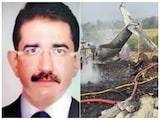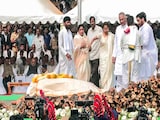Rifts within the Taliban are delaying the unveiling of a new Afghanistan government, sources told NDTV on Monday, blaming increasing discord between the Islamist group's Doha and Haqqani factions and the latter's reported refusal to accept Haibatullah Akhundzada as a 'supreme leader'.
Sources said the factions seemed divided over including political leaders from earlier governments - such as former President Hamid Karzai and two-time presidential candidate Abdullah Abdullah.
Taliban military commanders are said to be averse to their inclusion, while the extremist group's Doha wing is reportedly in favour.
The possible stand-off comes amid reports of a 'heated clash' between the Haqqanis (one of the world's more feared terrorist groups) and Mullah Baradar, one of Akhundzada's three deputies and the man widely expected to be in charge of the daily functioning of any new government.
Lieutenant General Faiz Hameed, the chief of Pakistan's ISI, flew in yesterday, possibly to avert a possible crisis and amid questions over the spy agency pushing for a greater role for the Haqqanis.
A report by AFP last month said the Haqqanis are blamed for some of the deadliest and most shocking attacks in Afghanistan in the last two decades.
Sirajuddin, son of founder Jalaluddin Haqqani, is wanted by the United States' FBI, which has offered a reward of up to US$5 million for his arrest.
They have also long been suspected of links with the Pakistani military establishment - US Admiral Mike Mullen, who served as the US' Chairman of the Joint Chiefs of Staff between 2007 and 2011 - described them as a "veritable arm" of Islamabad's intelligence in 2011.
Pakistan denies the allegation.
The Haqqanis have also hugely contributed to the Taliban's fighting ranks, and are its "most combat-ready forces", United Nations monitors said in a June report.
Last week Taliban and other Afghan leaders said they had reached a "consensus" over the formation of a new government and cabinet. Haibatullah Akhundzada would be the top leader of any governing council, and Mullah Baradar in charge of daily operations, reports indicated.
"We're about to announce a functioning cabinet and government in a few days, not weeks," Bilal Karimi, a member of the group's cultural commission, was quoted in a Bloomberg report.
Reuters reported that Baradar would be joined by Mullah Mohammad Yaqoob (son of late Taliban co-founder Mullah Omar) and Sher Mohammad Abbas Stanekzai, in senior positions.
A Taliban official told Reuters that top leaders had already arrived in Kabul.
The Taliban swept into Kabul on August 15, amid chaos triggered by US and western forces withdrawal from the region. Their arrival led to panic in the country as thousands tried to flee.
The group - feared for their brutal first regime - has promised to be more moderate and inclusive, particularly in regards to human rights and gender equality, but reports like the one that emerged today - a pregnant policewoman was shot dead - have raised fears they will revert to type.
Meanwhile, this morning the Taliban claimed to have "completely captured" the Panjshir Valley - the last pocket of resistance in Afghanistan.
With input from AFP, Bloomberg, Reuters















